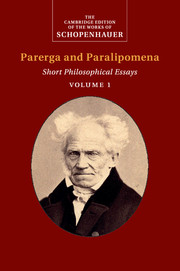Book contents
- Frontmatter
- Contents
- General Editor’s Preface
- Editorial Notes and References
- Introduction
- Notes on Text and Translation
- Chronology
- Bibliography
- Parerga and Paralipomena: Contents
- Preface
- Sketch of a History of the Doctrine of the Ideal and the Real
- Fragments for the History of Philosophy
- On University Philosophy
- Transcendent Speculation on the Apparent Deliberateness in the Fate of the Individual
- Essay on Spirit-Seeing and Related Issues
- Aphorisms on the Wisdom of Life
- Chapter I Fundamental Division
- Chapter II What One Is
- Chapter III What One Has
- Chapter IV What One Represents
- Chapter V Counsels and Maxims
- Chapter VI On the Different Stages of Life
- Versions of Schopenhauer’s Text
- Glossary of Names
- Index
Chapter III - What One Has
Published online by Cambridge University Press: 30 June 2022
- Frontmatter
- Contents
- General Editor’s Preface
- Editorial Notes and References
- Introduction
- Notes on Text and Translation
- Chronology
- Bibliography
- Parerga and Paralipomena: Contents
- Preface
- Sketch of a History of the Doctrine of the Ideal and the Real
- Fragments for the History of Philosophy
- On University Philosophy
- Transcendent Speculation on the Apparent Deliberateness in the Fate of the Individual
- Essay on Spirit-Seeing and Related Issues
- Aphorisms on the Wisdom of Life
- Chapter I Fundamental Division
- Chapter II What One Is
- Chapter III What One Has
- Chapter IV What One Represents
- Chapter V Counsels and Maxims
- Chapter VI On the Different Stages of Life
- Versions of Schopenhauer’s Text
- Glossary of Names
- Index
Summary
Epicurus, the greatteacher of happiness, has correctly and beautifullydivided human needs into three categories. First,the natural and necessary ones: these are the onesthat cause pain when not satisfied. Consequentlyonly food and clothing belong here. They are easy tosatisfy. Second, the natural but unnecessary ones:that is the need for sexual satisfaction, althoughEpicurus does not pronounce this clearly in theaccount of Laertius (as, in general, I reproduce hisdoctrine here in a somewhat adjusted and polishedform). This need is more difficult to satisfy.Third, the neither natural nor necessary ones: theseare the needs for luxury, opulence, pomp, andsplendour. They are infinite and their satisfactionis very difficult. (See Diogenes Laertius, Book X,ch. 27, §149 and also §127, and Cicero, On the Ends of Goods andEvils I, chs. 14 and 16.)
On the other hand, it is difficult, if not impossible,to determine the limits of our rational desires inregard to possessions. For everyone's satisfaction,in this respect, does not depend on an absolute, buton a merely relative quantity, namely on therelation between his demands and his possessions;hence the latter, considered on their own, aremeaningless, just like the numerator of a fractionwithout the denominator. The goods which it hasnever occurred to someone to demand, he does notmiss at all, but he is perfectly happy even withoutthem; whereas another, who possesses a hundred timesmore, is unhappy because he lacks a thing that helays claim to. Everyone has, in this respect too,his own horizon of what he can possibly attain; andhis demands extend as far as this. When some objectwithin this horizon presents itself such that he cancount on its attainment, he is happy; in contrast,he feels unhappy when difficulties occur thatdeprive him of the prospect. What lies beyond thishorizon has no effect on him at all. Hence the largepossessions of the rich do not worry the poorperson; on the other hand, the rich person is notconsoled by the many things he already possesses ifhe misses his goals.
- Type
- Chapter
- Information
- Schopenhauer: Parerga and ParalipomenaShort Philosophical Essays, pp. 303 - 308Publisher: Cambridge University PressPrint publication year: 2014

